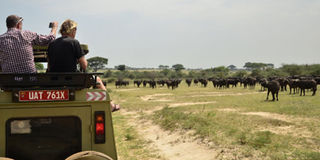Uganda must get it right in the tourism industry

Two parallel events - positive and negative - happened at the weekend in regard to the tourism sector.
To begin with, the good news – as was reported by this newspaper yesterday - is that Uganda Wildlife Authority has extended the 50 per cent discount on park entrance fees, gorilla permits, birding fees and chimpanzee permits by three more months to end of June to promote visits to the country’s national parks.
In the wake of the Covid-19 pandemic that necessitated lockdowns globally, the sector suffered the most yet it was the country’s top foreign earner.
Uganda earned $1.6b (about Shs5.8 trillion) from tourism in the 2018/2019 financial year, making the sector the country’s leading foreign currency earner for the fifth year in a row, according to the Annual Tourism Sector Performance Report for Financial Year 2018/2019, up from $1.45b (Shs5.3 trillion) in the 2017 financial year. The number of tourists also topped 1.5 million that year.
The earnings thus accounted for 7.7 per cent of the national GDP and 6.7 per cent of total national employment after creating 667,600 jobs. Not a sector to ignore by any form of imagination!
Therefore, dangling such carrots was and remains the best incentive to jump-starting the sector. We are happy the wild life officials are taking such steps and should up the ante on the scramble for tourists through robust advertising and promotion of domestic tourism, among others.
On the negative side, we condemn the killing of six lions in Queen Elizabeth National Park in what authorities suspect was poisoning. The nature of lions we have at the national park are a treasure; they are very rare on planet earth.
Across the world, there are two places to find tree-climbing lions - and only in East Africa - in the Ishasha sector of Queen Elizabeth National Park and in Lake Manyara National Park of Tanzania.
Many countries that pride in tourism such as Kenya and South Africa do not have the privilege that is before us. The lions there have rarely been seen climbing trees.
Therefore, the revelation that the animals’ heads, feet, tails, hearts and livers were cut and taken away, points to a more dangerous trend.
It is upon us to safeguard what we have and even market them more. It is also imperative that we do whatever is within our means to establish the motive of the perpetrators.
It is good that UWA has placed a Shs10m reward for anyone who will provide information leading to the arrest of the lion killers.
But the long-term measure is to tighten the security in our national parks for both the tourists and animals.
Insecurity could spell doom for the whole sector.




